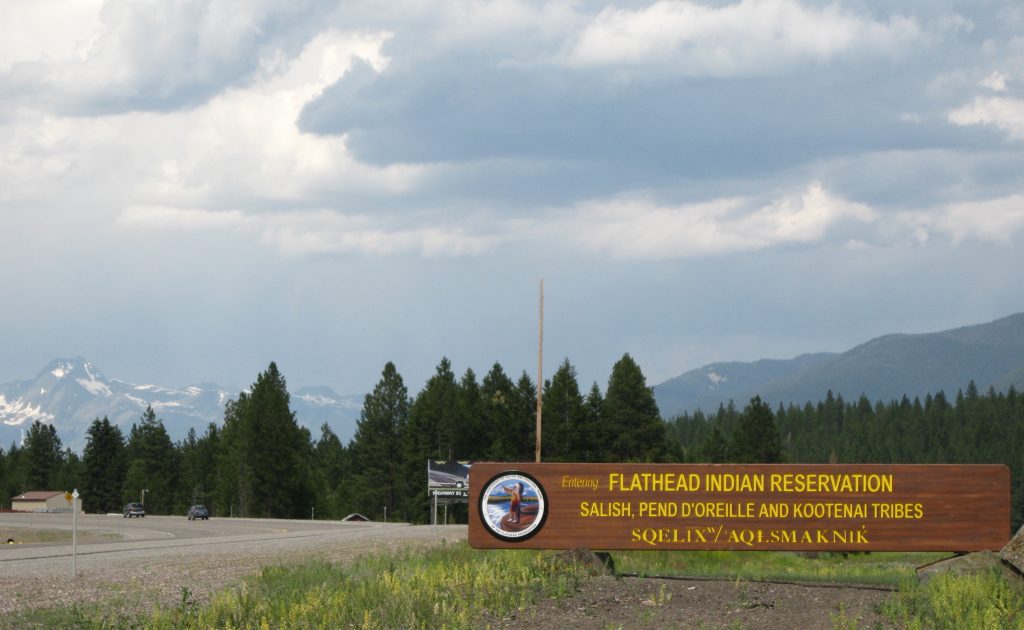Podcast: Play in new window | Download | Embed
Federal officials say they don’t have many resources to offer if it takes over law enforcement on Northwest Montana’s Flathead Reservation.
Montana Public Radio’s Aaron Bolton reports those comments come as the county plans to stop providing those services on the reservation.
For decades, Lake County has overseen felony jurisdiction on the Flathead Reservation as part of a long-standing agreement. But commissioners say the county can no longer afford it and wants to pull out.
That would pass jurisdiction to the state, but Gov. Greg Gianforte (R-MT) says the state is also pulling out of the agreement.
That means the federal government would take over, but Montana U.S. Attorney Jesse Laslovich says federal agencies are already stretched.
“And we know for a certainty at this point that it will be … worse in the short term from a resource perspective in holding people accountable.”
He says his office would only be able to prosecute bigger cases that impact a large number of people like large drug distribution or sex trafficking.
Lower-level felony offenses might go unchecked.
“That’s an unacceptable consequence.”
County Commissioner Gale Decker says it costs about $4 million to provide law enforcement services on the reservation.
“If we have to stay in it for public safety concerns, then we’ll have to make decisions about where we can find extra money.”
Commissioner Decker says that could come in the form of budget cuts, staff layoffs, or asking voters to approve a levy.
If Lake County continues with its plan to pull out of the agreement, the federal government would take over May 21.

Niin Wigwamis / My Little Home Project in Canada. (Courtesy Garden River First Nation / Facebook)
Canada’s auditor general says the federal government is failing to pledges on housing and policing to the country’s Indigenous people.
It’s a refrain that was voiced by previous fiscal watchdogs, as Dan Karpenchuk reports.
Auditor General Karen Hogan released three reports this week, two of them focusing on housing and policing for First Nations.
She says her latest audit shows a distressing and persistent pattern of failure.
“I’m rather discouraged that it’s been twenty years and there is little progress despite the amount of money that’s been invested.”
Hogan says previous auditor general have talked about the situation being unacceptable and even beyond unacceptable.
She says, despite many warnings, the lack of funding for housing means that number of First Nations homes in need of repair is basically the same as it was in 2015.
She says it’s obvious that the process has not been working and there is twenty years of information to show that.
“I’d like to see a fundamentally different approach taken by the government to address the issues whether it be around safe drinking water, emergency preparedness, housing or policing. The approach of being passive and siloed and having communities apply, doesn’t appear to be working.”
Hogan says adequate housing is a basic human need and adds that she’s completely discourage that so many First Nations families continue to live in substandard homes.
Hogan’s report says the Indigenous Services Canada and the Canada Mortgage and Housing Corporation have made little progress to support First Nations efforts towards better housing conditions in their communities.
She also says the data shows that government agencies have not given priority to communities with greatest needs and those communities with poorest housing conditions got less money that those with better housing conditions.

Swinomish Indian Tribal Community members and staff tend the clam garden. (Courtesy Swinomish Fisheries Department)
More than $30 million for 42 climate projects have been awarded to tribal communities in Alaska under the Bureau of Indian Affairs’ Tribal Climate Resilience Annual Awards Program.
Alaska received about one-quarter of the $120 million in awards recently announced.
The funds are intended to help address climate change.
Get National Native News delivered to your inbox daily and stay up-to-date on the 2024 Native Vote. Sign up for our daily newsletter today.



